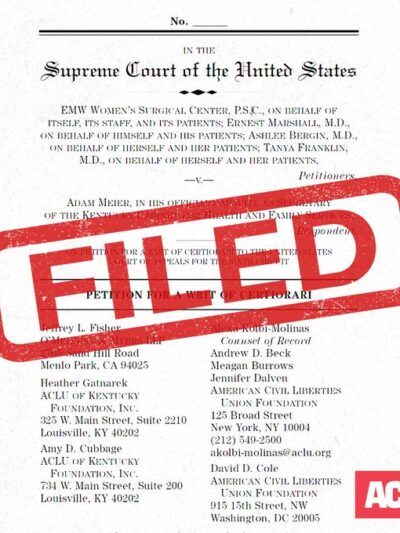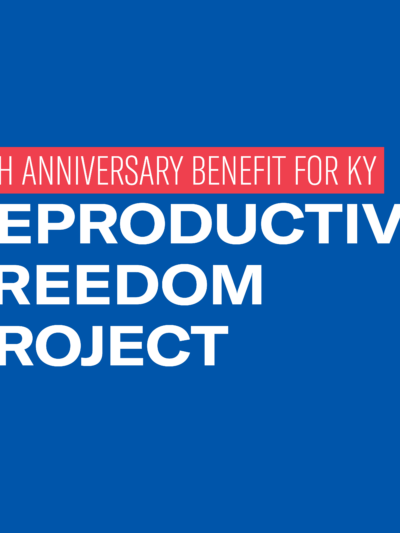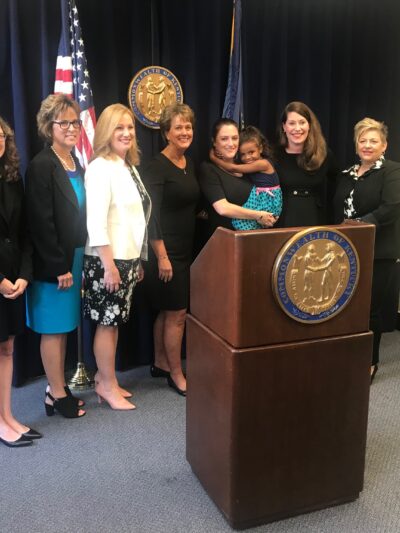News & Commentary
Dec 20, 2019
Legislation Addressing Racial Discrepancies in Maternal Health
Kentucky must implement policies addressing racial bias in medicine and increase access to doulas, who support pregnant patients. Learn more and tell your legislators to VOTE YES on the Maternal CARE Act here.

Dec 09, 2019
Supreme Court Declines to Hear Challenge to Unethical Kentucky Abortion Law
WASHINGTON — The Supreme Court announced today it would not review a decision by the Sixth Circuit Court of Appeals upholding Kentucky’s forced narrated ultrasound law against a First Amendment challenge. Today’s ruling allows H.B. 2, Kentucky’s forced, narrated ultrasound law, to take effect. The physicians at Kentucky’s last abortion clinic will be forced to subject every patient to their ultrasound images, a detailed description of those images, and the sounds of the fetal heart tones prior to an abortion — even if the patient objects or is covering their eyes and blocking their ears, and even if the physician believes that doing so will cause harm to the patient. “By refusing to review the Sixth Circuit’s ruling, the Supreme Court has rubber-stamped extreme political interference in the doctor-patient relationship,” said Alexa Kolbi-Molinas, senior staff attorney at the ACLU Reproductive Freedom Project. “This law is not only unconstitutional, but as leading medical experts and ethicists explained, deeply unethical. We are extremely disappointed that the Supreme Court will allow this blatant violation of the First Amendment and fundamental medical ethics to stand.”H.B. 2 has been widely and unequivocally condemned by the medical community, including in friend-of-the-court briefs submitted by the American Medical Association, the American College of Obstetricians and Gynecologists, and the American Public Health Association, as well as by more than 130 leading biomedical ethicists from around the country.

Sep 26, 2019
ACLU Asks Supreme Court to Overturn Ruling Upholding Kentucky Forced Narrated Ultrasound Law
The American Civil Liberties Union asked the U.S. Supreme Court to overturn a decision by the Sixth Circuit Court of Appeals upholding Kentucky’s forced narrated ultrasound law against a First Amendment challenge. With the filing of today’s petition for a writ of certiorari, the case becomes the third challenge to an abortion restriction pending before the Supreme Court this term.The law, also known as H.B. 2, requires doctors to force ultrasound images and a detailed description of those images on every patient prior to an abortion—even if the patient objects or is covering their eyes and blocking their ears. Prior to H.B. 2, providers in Kentucky always offered to display and discuss the ultrasound with their patients, but would never force that information on them against their will. Major medical associations — including the American Medical Association, American College of Obstetricians and Gynecologists, and the American Public Health Association — oppose the law because it violates basic ethical and informed consent principles.“This sort of extreme political interference in the doctor-patient relationship has no place in the exam room,” said Alexa Kolbi-Molinas, senior staff attorney with the ACLU Reproductive Freedom Project. “The sole purpose of this law is to shame and coerce someone who has decided to end their pregnancy. It’s time to stop criminalizing health care, interfering with personal decisions, and substituting political agendas for the expertise of health care professionals.”When it was issued this past April, the ruling sparked an impassioned dissent from Sixth Circuit Judge Bernice Bouie Donald, who recognized that “H.B. 2 would require physicians to violate their professional and ethical obligations … [and] that H.B. 2’s one-size-fits-all approach would cause them to harm their patients.” As Judge Donald explained, the majority “decision opens the floodgates to states in this Circuit to manipulate doctor-patient discourse solely for ideological reasons.” She wrote, “The Commonwealth has co-opted physicians’ examining tables, their probing instruments, and their voices in order to espouse a political message, without regard to the health of the patient or the judgment of the physician.” The ruling also conflicts with an earlier decision by the Fourth Circuit Court of Appeals, which struck down an identical North Carolina law because it violated the First Amendment. Unless the Supreme Court resolves this “circuit split,” a doctor’s basic First Amendment rights depend solely on the state in which they practice.The plaintiffs in the case are represented by the ACLU, the ACLU of Kentucky, and the law firm of O’Melveny & Myers.More about this case can be found here: https://www.aclu.org/cases/emw-womens-surgical-center-v-beshear

Sep 11, 2019
Celebrating 30 Years of Protecting Reproductive Freedom
The ACLU of Kentucky invites you to celebrate the 30th Anniversary of the Reproductive Freedom Project.

Jul 30, 2019
Know Your Rights: Pregnant Workers in Kentucky
A new Kentucky law gives pregnant workers a clear right to reasonable accommodations when needed to keep them healthy and safe on the job, absent undue hardship on the employer.

May 10, 2019
VICTORY: Court Strikes Down D&E Abortion Ban
On May 10, 2019 a federal district judge struck down a Kentucky law prohibiting physicians from providing dilation and evacuation (D&E), the standard method for abortion care after about 14 or 15 weeks. Leading medical experts such as the American College of Obstetricians and Gynecologists oppose this type of restriction.

Sep 28, 2018
VICTORY! Transfer/Transport Agreements for Abortion Clinics Unconstitutional
Following a three-day trial in September 2017, during which experts and abortion providers testified to the devastating impact of shutting down Kentucky’s last abortion clinic, a federal district court struck down a Kentucky law that would have effectively banned abortion in the Commonwealth. This decision keeps open the doors of the only health center in Kentucky that provides safe and legal abortion care, EMW Women’s Surgical Center. The decision also paves the way for Planned Parenthood of Indiana and Kentucky (PPINK) to expand access to safe, legal abortion in Kentucky.

Aug 01, 2018
Share Your Story: Help us pass the Pregnant Workers Rights Act
Kentuckians shouldn't have to choose between a healthy pregnancy and their job! Have you ever experienced an obstacle at work because of your pregnancy? Are you an employer that made accomodations for pregnant employees or employees that were breastfeeding or pumping breast milk? Tell us about it. Sharing your story will help us as we work to pass the Pregnant Workers Rights Act.

Stay Informed
Sign up to be the first to hear about how to take action.
By completing this form, I agree to receive occasional emails per the terms of the ACLU’s privacy statement.
By completing this form, I agree to receive occasional emails per the terms of the ACLU’s privacy statement.
